Sometimes a writer tries to do something, and it just doesn’t work. At all. Needful Things was Stephen King’s attempt to write “The Last Castle Rock Story” and bring his invented town, which served as the setting for several of his books, to an end. Only it wasn’t the last Castle Rock story, because the fictional burg later appeared in Bag of Bones, Lisey’s Story, Under the Dome, and numerous short stories.
It also wasn’t supposed to be a horror novel. King wanted to write a comedy about the Eighties and figured that Needful Things would be his stab at satire. That was a great idea, only no one told the marketing department and they sold it as a horror book with nary a mention of satirical intent. The critics blasted it, and while it seems strange to call a book that sold over 1.5 million copies a failure, it’s the only Stephen King book in years not to reach #1 on the hardback or paperback New York Times bestseller lists. Today it’s not held in very high regard. And there’s a good reason for that. Because all other problems aside, it’s not a very good book.
King started writing Needful Things in 1988 and finished in 1991, making it the first book he wrote start to finish while sober. In an interview with The Paris Review he says, “I was in a sensitive place…because it was the first thing that I’d written since I was sixteen without drinking or drugging. I was totally straight, except for cigarettes.” It all started when King was driving home from a basketball game one night and he started thinking about how funny the Eighties were.
“…my thoughts centered on Jim and Tammy Faye Bakker, of the PTL Club. It occurred to me that in the Eighties, everything had come with a price tag, that the decade quite literally was the sale of the century. The final items up on the block had been honor, integrity, self-respect, and innocence. By the time I got home that night, I had decided to turn the Eighties into a small-town curio shop called Needful Things and see what happened. I told myself to keep it light and surreal; that if I just kept in mind the Bakkers’ doghouse, which had been equipped with heaters and running water, I would be okay.”
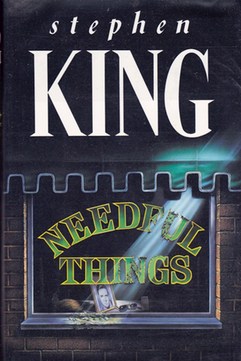 The result was King’s longest book since It, marking the beginning of a period when his books bulked up. In the sixteen years before 1990, King wrote three books that topped out at 600+ pages. After 1990, over the next sixteen years, he wrote nine. Needful Things was a big book, which made sense when you considered the enormous amount of plot (not story) crammed into it. A mysterious stranger arrives in Castle Rock and opens an antiques and collectibles store called Needful Things. The local residents, each of whom comes complete with a long backstory, intricately mapped resentments, and hidden desires, start popping by his store and each finds something that they really, really want. Eleven-year-old Brian Rusk finds a signed Sandy Koufax baseball card; corrupt town councilman, Danforth “Buster” Keeton, finds a toy that lets him predict winning horse races; Nettie Cobb, trying to put her life back together after serving time for killing her husband, finds beautiful pieces of carnival glass; Cora Rusk finds a pair of sunglasses that allow her visualize Elvis Presley making love to her.
The result was King’s longest book since It, marking the beginning of a period when his books bulked up. In the sixteen years before 1990, King wrote three books that topped out at 600+ pages. After 1990, over the next sixteen years, he wrote nine. Needful Things was a big book, which made sense when you considered the enormous amount of plot (not story) crammed into it. A mysterious stranger arrives in Castle Rock and opens an antiques and collectibles store called Needful Things. The local residents, each of whom comes complete with a long backstory, intricately mapped resentments, and hidden desires, start popping by his store and each finds something that they really, really want. Eleven-year-old Brian Rusk finds a signed Sandy Koufax baseball card; corrupt town councilman, Danforth “Buster” Keeton, finds a toy that lets him predict winning horse races; Nettie Cobb, trying to put her life back together after serving time for killing her husband, finds beautiful pieces of carnival glass; Cora Rusk finds a pair of sunglasses that allow her visualize Elvis Presley making love to her.
Gaunt charges low, low prices, but asks that each individual perform a “prank” for him. Brian Rusk throws mud on Wilma Jerzyck’s sheets. Wilma blames Nettie Cobb for it, and when another customer kills Nettie’s beloved dog, Nettie blames her longtime enemy, Wilma, and eventually the two women kill each other. This kind of thing escalates. The only person who seems unaffected is Sheriff Alan Pangborn, most recently of The Dark Half, who winds up learning Gaunt’s true identity and has a big confrontation with him at the climax. And what a climax it is, if you allow that it’s cut and pasted from previous King novels. Ace Merrill, the bully from “The Body”, has gotten out of prison (Shawshank, of course) and become Gaunt’s right-hand man. He’s driving around town in a magic car blowing things up, while Gaunt is distributing free guns to his best customers, who use them to shoot up the place. In the end, Gaunt is defeated and Castle Rock explodes, just like Chamberlain, Maine at the end of Carrie, just like Derry at the end of It, just like Jerusalem’s Lot at the end of ‘Salem’s Lot, just like the Overlook Hotel at the end of The Shining, just like…you get the picture.
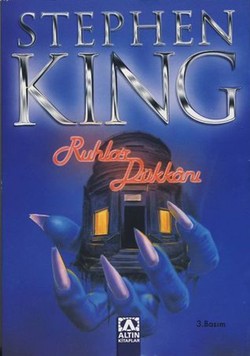 Needful Things debuted at #2 on the New York Times hardcover bestseller list, beaten out of the top position by Scarlett, the “sequel” to Gone with the Wind. It never reached #1, making it the first King book since his Bachman Books collection to fail to do so. It debuted at #3 on the paperback list, and never rose any higher. The reviews were terrible. The New York Times weighed in with a snotty piece by Joe Queenan that took it as a given that King was a hack, calling his book, “Big, dumb, plodding, and obvious…” while People Magazine wrote that it was “…page after page of death-by-numbers exercise.” Publishers Weekly was one of the sole exceptions, saying that “…the novel ranks with King’s best.” But even King, years later, said, “The reviewers called it an unsuccessful horror novel, even though I had assumed everybody would see it as a satire. Over the years I’ve come to think that, well, maybe it just wasn’t a very good book.”
Needful Things debuted at #2 on the New York Times hardcover bestseller list, beaten out of the top position by Scarlett, the “sequel” to Gone with the Wind. It never reached #1, making it the first King book since his Bachman Books collection to fail to do so. It debuted at #3 on the paperback list, and never rose any higher. The reviews were terrible. The New York Times weighed in with a snotty piece by Joe Queenan that took it as a given that King was a hack, calling his book, “Big, dumb, plodding, and obvious…” while People Magazine wrote that it was “…page after page of death-by-numbers exercise.” Publishers Weekly was one of the sole exceptions, saying that “…the novel ranks with King’s best.” But even King, years later, said, “The reviewers called it an unsuccessful horror novel, even though I had assumed everybody would see it as a satire. Over the years I’ve come to think that, well, maybe it just wasn’t a very good book.”
And it’s not. There’s some nice writing in Needful Things, and Alan Pangborn and his best gal, Polly Chalmers, who suffers from debilitating arthritis, are good guys you actually root for. There’s even a genuinely shocking suicide (that ticked off Sandy Koufax to no end). King has been terrific, ever since ‘Salem’s Lot, at depicting an entire town in crisis, and he jumps from character to character with a sure, masterly hand. Wrangling a massive cast while keeping the unfolding action clear is not an easy thing to do and it’s a strength King has used often in books like ’Salem’s Lot, Under the Dome and The Stand. Needful Things feels very much like an extension of ‘Salem’s Lot with Leland Gaunt’s store resembling the antiques store opened by that book’s vampiric duo, Straker and Barlow. Gaunt has long teeth like Barlow, he’s very tall like Barlow, the interior of his shop is similarly dim, and he has a whole “Enter freely and of your own will,” rap that he gives his customers, which is reminiscent of traditional vampire patter.
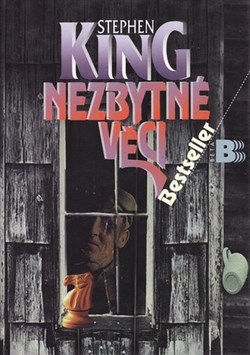 But the Needful Things gets caught up in a dismal wash-and-repeat pattern: resident of Castle Rock has tensions with another resident, they enter Needful Things, they find some item they really want, they get addicted to it, they pull a prank on someone else, prank kicks off an escalating spiral of violence, someone dies horribly. This happens over and over again for Brian Rusk, Danforth Keeton, Norris Ridgewick, Wilma Jerzyck, Nettie Cobb, Cora Rusk, Hugh Priest, Lenore Potter, Myra Evans, and on, and on, and on, and on. Even worse, we’re treated to all of these people’s internal monologues as they obsess over their Needful Things treasure, and they all sound exactly alike: greedy and vindictive. The only one who’s different is Danforth Keeton, who occasionally leavens his monologues with bouts of paranoia. The chapters become Stephen King Mad Libs, going through the same steps in almost the same voice, with only the occasional change of noun.
But the Needful Things gets caught up in a dismal wash-and-repeat pattern: resident of Castle Rock has tensions with another resident, they enter Needful Things, they find some item they really want, they get addicted to it, they pull a prank on someone else, prank kicks off an escalating spiral of violence, someone dies horribly. This happens over and over again for Brian Rusk, Danforth Keeton, Norris Ridgewick, Wilma Jerzyck, Nettie Cobb, Cora Rusk, Hugh Priest, Lenore Potter, Myra Evans, and on, and on, and on, and on. Even worse, we’re treated to all of these people’s internal monologues as they obsess over their Needful Things treasure, and they all sound exactly alike: greedy and vindictive. The only one who’s different is Danforth Keeton, who occasionally leavens his monologues with bouts of paranoia. The chapters become Stephen King Mad Libs, going through the same steps in almost the same voice, with only the occasional change of noun.
At the end of the book, things take a turn into the land of the serious cliché. Taking a cue from It, Sheriff Pangborn uses novelty items imbued with the Magical Power of Believing to battle Gaunt, then he makes shadow puppets of the sparrows from The Dark Half and of Cujo from Cujo to whip him into submission. There’s a supernatural car, as in Christine, at the climax, too. It’s as if King has run out of imagination, something you can see in everything from Leland Gaunt’s on-the-nose name to his, literally, writhing black bag of human souls.
But there’s something a bit more poisonous here, too. In an interview, King talks about how he follows his characters wherever they lead.
“When I begin a novel I’m mostly thinking about how neat and how funny certain ideas and scenes are…With Needful Things, when I came out of it I still was sort of saying ‘How neat,’ whereas when you put the ideas into practice they usually stop being neat and funny. Indeed, there’s a subplot in Needful Things about these two gay high school teachers who have a falling out over some misplaced cocaine and shoot each other. That’s the kind of thing where, when I thought that up I said: ‘How neat, how funny,’ and when it comes out it’s kind of sad and horrible.”
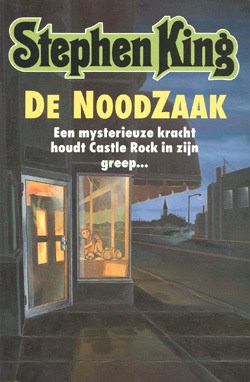 That’s the least of it. The dark secrets that King grasps for in this book are the kind of hoary old clichés last seen in made-for-TV movies from the Seventies. His gay characters turn out to be closeted pedophiles. The single mother who had a baby out of wedlock is haunted by guilt over hiring a junkie babysitter who burned down her house (“I’m not a fit mother!”). Catholics and Baptists can’t get along. And Leland Gaunt is basically an update of the iconic Wandering Jew character from folklore and legend, an immortal peddler who comes to a town full of Christians, sets them against each other with the power of economics, then sells them weapons to capitalize on the hatred he himself has stirred up. It’s definitely an accidental association, but a toxic one, and it makes King sound old, frightened, narrow-minded, shallow, and it leaves a bad aftertaste in the reader’s mouth.
That’s the least of it. The dark secrets that King grasps for in this book are the kind of hoary old clichés last seen in made-for-TV movies from the Seventies. His gay characters turn out to be closeted pedophiles. The single mother who had a baby out of wedlock is haunted by guilt over hiring a junkie babysitter who burned down her house (“I’m not a fit mother!”). Catholics and Baptists can’t get along. And Leland Gaunt is basically an update of the iconic Wandering Jew character from folklore and legend, an immortal peddler who comes to a town full of Christians, sets them against each other with the power of economics, then sells them weapons to capitalize on the hatred he himself has stirred up. It’s definitely an accidental association, but a toxic one, and it makes King sound old, frightened, narrow-minded, shallow, and it leaves a bad aftertaste in the reader’s mouth.
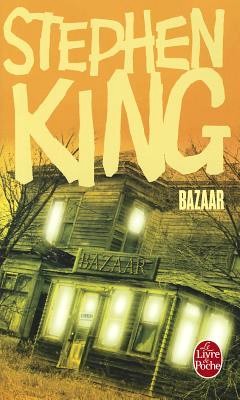 But despite these flaws the proof is in the pudding: 1.5 million copies sold. The success of Needful Things has been attributed to a lot of things. The fact that it was a Stephen King book, published at the height of his fame. The fact that it was marketed as “The Last Castle Rock Story” and every reader wants to pick up an event book, the same way every comic book reader wants to pick up the storyline that “Will Change Everything!” even when they know it won’t. Some people have said that the mania for antiques at the time it was published had something to do with it, and there’s something to that. In the Eighties, about thirty books a year about antiques and collectibles were published, but from 1989 to 1991, 300 were published (110 in 1991 alone). Maybe those three things combined lifted sales to 1.5 million copies. But the book hasn’t had the lasting power of other Stephen King books, and its profile has mostly been maintained by the 1993 movie version starring Max Von Sydow and Ed Harris.
But despite these flaws the proof is in the pudding: 1.5 million copies sold. The success of Needful Things has been attributed to a lot of things. The fact that it was a Stephen King book, published at the height of his fame. The fact that it was marketed as “The Last Castle Rock Story” and every reader wants to pick up an event book, the same way every comic book reader wants to pick up the storyline that “Will Change Everything!” even when they know it won’t. Some people have said that the mania for antiques at the time it was published had something to do with it, and there’s something to that. In the Eighties, about thirty books a year about antiques and collectibles were published, but from 1989 to 1991, 300 were published (110 in 1991 alone). Maybe those three things combined lifted sales to 1.5 million copies. But the book hasn’t had the lasting power of other Stephen King books, and its profile has mostly been maintained by the 1993 movie version starring Max Von Sydow and Ed Harris.
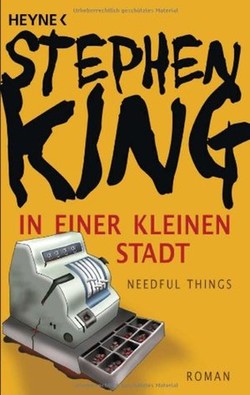 But as unpleasant as Needful Things is, and it is the very definition of a slog (although individual readers’ taste for slogs may vary), it served a vital function. King hits moments in his career when he needs to write big books that purge him of his current obsessions so that he can move on to a new field of interests. It happened with The Stand, and it happened with It. And it definitely happened with Needful Things. This is the book where King cleaned out his basement, threw all his old tricks into the incinerator, and burned them up. Out of the ashes came two of his most unique books, Gerald’s Game and Dolores Claiborne, two ambitious novels that, while not perfect, don’t rely on a single trick from Stephen King’s Great Big Bag of Tricks. Which is a good thing because by the time he reached Needful Things that bag was as stuffed and worn out as Leland Gaunt’s silly, writhing bag of human souls.
But as unpleasant as Needful Things is, and it is the very definition of a slog (although individual readers’ taste for slogs may vary), it served a vital function. King hits moments in his career when he needs to write big books that purge him of his current obsessions so that he can move on to a new field of interests. It happened with The Stand, and it happened with It. And it definitely happened with Needful Things. This is the book where King cleaned out his basement, threw all his old tricks into the incinerator, and burned them up. Out of the ashes came two of his most unique books, Gerald’s Game and Dolores Claiborne, two ambitious novels that, while not perfect, don’t rely on a single trick from Stephen King’s Great Big Bag of Tricks. Which is a good thing because by the time he reached Needful Things that bag was as stuffed and worn out as Leland Gaunt’s silly, writhing bag of human souls.
Grady Hendrix is the author of Satan Loves You, Occupy Space, and he’s the co-author of Dirt Candy: A Cookbook, the first graphic novel cookbook. He’s written for publications ranging from Playboy to World Literature Today and his story, “Mofongo Knows” appears in the anthology, The Mad Scientist’s Guide to World Domination.










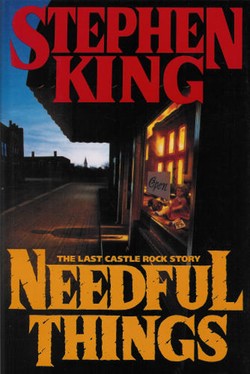
I really liked the movie. I certainly don’t think it was his worst, that honor goes to The Cell. Oh, and Doctor Sleep is terrific.
Even as a kid who knew next to nothing about Stephen King, I remember the hype about “The Last Castle Rock Story.” I also remember being slightly terrified watching the movie trailer, which looking back definitely felt like a dark comedy. I think there was a charcter who asked Gaunt something like, “I just killed my wife. Is that bad?”
Too bad – it seems on the surface like a good concept, but sounds like it just buckled under how much he was trying to put in it.
Another great write-up, Grady. Thanks! These have been so enjoyable.
The review makes this book sound awful, but this is really one of my favorite King books of the ones I read. I liked it better than IT. I love it when King does his big town books and does PoV of everyone in the town so you feel the size of it. I also loved how it tied together all his Castle Rock books. I just really loved Castle Rock, and sorry but the stuff in Bag of Bones and what not does NOT count the same as a true Castle Rock novel. Not at all. I also thought it was a clever satire of the 80’s, and I liked that part of it. It reminded me a bit of GRRM’s Sandkings as well. The ending shoot out was like Twilight Zone where all the neighbors start killing each other cause one will have power while the rest don’t. Was it his best novel? No, but I certainly liked it.
@3, I really enjoyed it too. And yes, those other stories, while they reference Castle Rock, they don’t really pertain to Castle Rock.
On a cross country no-stop drive once – we listened to a cassette unabridged copy of Needful Things – it kept us wide awake and alert and on edge the whole time —- there was a little bell sound everytime the shop door opened – I loved that !!!!!!!!
I think this book could have been cut down and, sure, it had it’s problems (Just like anything does), but really, it wasn’t that bad at all. The fact that there were so many characters only added scope to the size of the town, something that was happening to all of them instead of just a few. How all of the “Pranks” played by customers of Needful Things intertwined and inevitably led to huge violent showdowns. I really could have donw without the ending, which I thought was cliche and kind of stupid. Also, the two gay teachers being pedophiles left a bad taste in my mouth, but that’s also because I’m a member of the LGBT community and I cannot stand that stereotype. But sometimes a story is just a story and it could be crazy but maybe, just maybe, Leland Gaunt is not the Travelling Jew and what not…maybe he’s just a character in a book. The people in this book seemed very realy and, not to sound like too much of a cynic, but the internal monologues mostly being greedy and corrupt is spot on. Get inside the minds of poeple and most of us are greedy and selfish and corrupt. At least, that may be part of our personality, even if it’s not the controlling part. We all of us want something, need something so bad that we’ll do just about anything to have it or to get it done.
I have to agree with about everything stated here. I’m currently reading the book..about 3/4 of the way through and we are getting rather repetitive. I’m about ready to skip to the end and I’ve never done that before. I’m going back through King’s works and getting into some older stuff. I have to say..I like the new stuff much better. As someone mentioned Doctor Sleep was quite enjoyable.
Great article but this is the book I enjoy most of King’s. It isn’t his most eloquently written but it sure is a lot of fun.
I had to skip to the end years ago also, but loved the pawn shop.
Hard to believe this review is of the same book I read. “Needful Things” was a wonderfull fable, and far better than “It” or “Tommyknockers”. While King’s books run the gamut from “ok reads” to “timeless classics,” he’s never written anything that can be characterized as bad. He’s an American treasure, and he’ll be spoken of in generations to come the way Poe is spoken of today.
I read Needful Things when it first came out and loved it. I enjoy Stephen King mixing in characters of past books; it makes me think of those other stories. I also saw the movie when it first came out – enjoyed that too; however, I was disappointed in the movie because it did not follow the book. Good movie though, I just consider it “loosely based” on King’s novel. I am currently rereading Needful Things. One of the things I enjoy about King’s writing is the depth and insight he gives his characters.
Long live the King!
I liked this book. In retrospect, I can agree with some of the criticism in this review – repetitive structure, kliched secrets. Maybe the ending was a bit cheap but it didn´t bother me that much – Leland Gaunt wasn´t built up as a physical powerhouse like It or Randall Flagg, so it´s OK by me that he is rather easily defeated. The big challenge was for the protagonists to break out of his spells.
This book however more than maybe any other King book gives pointed social commentary. The objects Gaunt sells are just trash, but his customers load them with deep feelings. They are too afraid to lose them to even use them. This is exactly what consumer culture is. The scene where the town drunk kills someones beloved dog, then sits in his home obsesively caressing his foxtail, a useless, dead object, is really chilling, I think.
Good book, but Something Wicked This Way Comes by Ray Bradbury was first and better than Needful Things.
I am almost half way through this book and I have to say, it’s not Terrible but it is rather repetitive! And I see alot of comments on how it’s better then IT, I’m going to strongly disagree there, IT is a book in a class all of its own when it comes to King novels.
I am only 26 but I’ve read all of his work except this and Tommy knockers, I don’t have high hopes for either as of now.
Great review.
I just finished reading Needful Things for the first time and I really enjoyed it. I loved the characters of Alan and Polly and hated saying goodbye to them at the end of the book. I also enjoyed getting to know the various other residents of Castle Rock and would have liked more resolution about how they managed to pick up the pieces and move on. Or not. It abruptly ended with the town being blown up and burning down. I know that Mr. Gaunt was driven out, but after investing in these characters, I want to know what happened to them next.